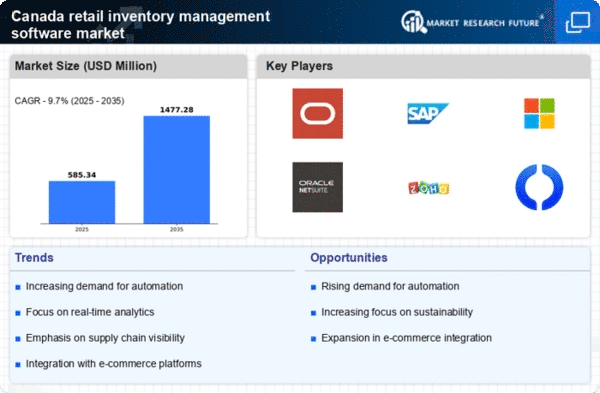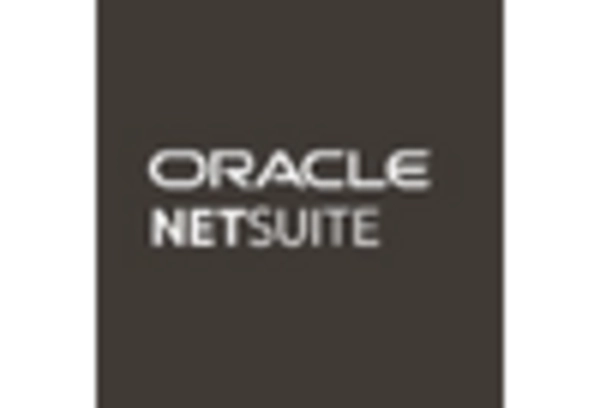Rising E-commerce Adoption
The retail inventory-management-software market is experiencing a notable surge due to the increasing adoption of e-commerce platforms in Canada. As more retailers transition to online sales, the demand for sophisticated inventory management solutions becomes critical. In 2025, e-commerce sales in Canada are projected to reach approximately $50 billion, indicating a robust growth trajectory. This shift necessitates advanced software that can seamlessly integrate with online platforms, manage stock levels in real-time, and provide analytics for better decision-making. Retailers are increasingly recognizing that effective inventory management is essential for maintaining competitive advantage in a crowded online marketplace. Consequently, the retail inventory-management-software market is likely to expand as businesses seek to optimize their operations and enhance customer satisfaction through improved inventory accuracy.
Increased Focus on Data Analytics
The retail inventory-management-software market is witnessing a growing emphasis on data analytics as retailers strive to make informed decisions. With the vast amounts of data generated from sales, customer interactions, and supply chain operations, the ability to analyze this information is becoming paramount. In Canada, approximately 70% of retailers are investing in analytics tools to enhance their inventory management processes. These tools provide insights into consumer behavior, demand forecasting, and inventory turnover rates, enabling retailers to optimize stock levels and reduce carrying costs. As the importance of data-driven decision-making continues to rise, the retail inventory-management-software market is likely to expand, offering solutions that incorporate advanced analytics capabilities to meet the evolving needs of retailers.
Regulatory Compliance and Standards
The retail inventory-management-software market is also shaped by the need for compliance with various regulatory standards in Canada. Retailers are required to adhere to regulations concerning product safety, labeling, and environmental impact. As these regulations become more stringent, the demand for inventory management solutions that facilitate compliance is increasing. Software that can track product origins, manage recalls, and ensure proper labeling is essential for retailers to avoid penalties and maintain consumer trust. In 2025, it is anticipated that compliance-related features will become a standard offering in inventory management software, further driving growth in the retail inventory-management-software market. This focus on compliance not only protects businesses but also enhances their reputation in the marketplace.
Shift Towards Omnichannel Retailing
is driven by the shift towards. As consumers increasingly expect a seamless shopping experience across various channels, retailers are compelled to adopt integrated inventory management solutions. This approach allows for real-time visibility of stock across physical stores, online platforms, and mobile applications. In 2025, it is projected that over 60% of retailers in Canada will implement omnichannel strategies, necessitating robust inventory management systems that can synchronize stock levels and fulfill orders efficiently. The ability to provide a consistent customer experience across channels is becoming a key differentiator in the competitive retail landscape, thereby driving demand for advanced inventory management software.
Technological Advancements in Software
The retail inventory-management-software market is significantly influenced by rapid technological advancements. Innovations such as cloud computing, mobile applications, and IoT integration are reshaping how retailers manage their inventory. In Canada, the adoption of cloud-based solutions is expected to grow by 30% over the next few years, allowing retailers to access their inventory data from anywhere, at any time. This flexibility not only enhances operational efficiency but also supports better collaboration among teams. Furthermore, the integration of IoT devices enables real-time tracking of inventory levels, reducing the risk of stockouts and overstock situations. As technology continues to evolve, the retail inventory-management-software market is poised for substantial growth, driven by the need for more efficient and responsive inventory management systems.
















